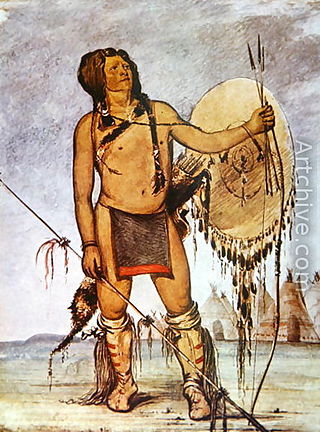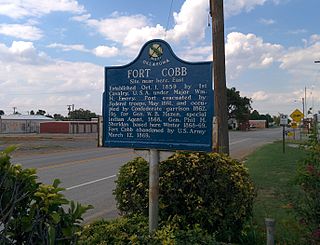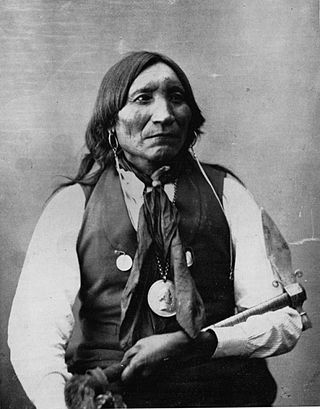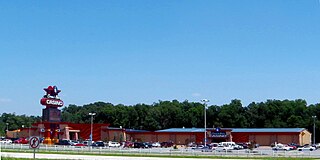
Faxon is a town in Comanche County, Oklahoma, United States. It is located on Oklahoma State Highway 36 about 18.3 driving miles southwest of Lawton. The population was 136 at the 2010 census. It is included in the Lawton, Oklahoma Metropolitan Statistical Area.

Benjamin Henry Grierson was a music teacher, then a career officer in the United States Army. He was a cavalry general in the volunteer Union Army during the Civil War and later led troops in the American Old West.

The Wichita people or Kitikiti'sh are a confederation of Southern Plains Native American tribes. Historically they spoke the Wichita language and Kichai language, both Caddoan languages. They are indigenous to Oklahoma, Texas, and Kansas.

Comanche history is the story of the Native American (Indian) tribe which lived on the Great Plains of the present-day United States. In the 17th century the Eastern Shoshone people who became known as the Comanche migrated southward from Wyoming. In the 18th and 19th centuries the Comanche became the dominant tribe on the southern Great Plains. The Comanche are often characterized as "Lords of the Plains." They presided over a large area called Comancheria which they shared with allied tribes, the Kiowa, Kiowa-Apache, Wichita, and after 1840 the southern Cheyenne and Arapaho. Comanche power and their substantial wealth depended on horses, trading, and raiding. Adroit diplomacy was also a factor in maintaining their dominance and fending off enemies for more than a century. They subsisted on the bison herds of the Plains which they hunted for food and skins.

Kicking Bird, also known as Tene-angop'te, "The Kicking Bird", "Eagle Who Strikes with his Talons", or "Striking Eagle" was a High Chief of the Kiowa in the 1870s. It is said that he was given his name for the way he fought his enemies. He was a Kiowa, though his grandfather had been a Crow captive who was adopted by the Kiowa. His mysterious death at Fort Sill on May 3, 1875, is the subject of much debate and speculation. Though he was a great warrior who participated in and led many battles and raids during the 1860s and 1870s, he is mostly known as an advocate for peace and education in his tribe. He enjoyed close relationships with whites, most notably the Quaker teacher Thomas Battey and Indian Agent James M. Haworth. The close relationships he enjoyed with whites engendered animosity among many of the Kiowas, making him a controversial figure. He would become the most prominent peace chief of the Kiowas, following the lead of a previous head chief, Dohasan. Kicking Bird was diplomatically active and signed the Little Arkansas Treaty of 1865 and the Medicine Lodge Treaty of 1867 and was instrumental in moving his people to reservations.

The First Dragoon Expedition of 1834 was an exploratory mission of the United States Army into the southwestern Great Plains of the United States. It was the first official contact between the American government and the Southern Plains Indians.
In United States history, an Indian agent was an individual authorized to interact with American Indian tribes on behalf of the government.

The Trial of Satanta and Big Tree occurred in May 1871 in the town of Jacksboro in Jack County, Texas, United States. This historic trial of Native American War Chiefs of the Kiowa Indians Satanta and Big Tree for the murder of seven teamsters during a raid on Salt Creek Prairie near Jacksboro, Texas, marked the first time the United States had tried Native American Chiefs in a state court. The trial attracted national and international attention. The two Kiowa leaders, with Satank, a legendary third War Chief, were formally indicted on July 1, 1871, and tried shortly thereafter, for acts arising out of the Warren Wagon Train Raid.

Fort Arbuckle was constructed by the US Army in 1850 to counter raids by Plains Indian tribes on immigrant trains heading west to California and on the settlements of Choctaw and Chickasaw nations in Indian Territory.

Chilocco Indian School was an agricultural school for Native Americans on reserved land in north-central Oklahoma from 1884 to 1980. It was approximately 20 miles north of Ponca City, Oklahoma and seven miles north of Newkirk, Oklahoma, near the Kansas border. The name "Chilocco" is apparently derived from the Creek tci lako, which literally meant "big deer" but typically referred to a horse.

Fort Cobb was a United States Army post established in what is now Caddo County, Oklahoma in 1859 to protect relocated Native Americans from raids by the Comanche, Kiowa, and Cheyenne. The fort was abandoned by Maj. William H. Emory at the beginning of the Civil War, but then occupied by Confederate forces from 1861–1862. The post was eventually reoccupied by US forces starting in 1868. After establishing Fort Sill the US Army abandoned Fort Cobb. Today there is little left of the former military post.

Guipago was the last Principal Chief of the Kiowa tribe. He was a member of the Koitsenko, the Kiowa warrior elite, and was a signer of the Little Arkansas Treaty in 1865.

The Quanah Parker Star House, with stars painted on its roof, is located in the city of Cache, county of Comanche, in the U.S. state of Oklahoma. It was added to the National Register of Historic Places listings in Comanche County, Oklahoma, in 1970.

Charge of the Model T's is a 1977 American comedy spy film directed by Jim McCullough Sr. with the screenplay by Jim McCullough Jr. based upon the novel of the same name by Lee Somerville. Starring John David Carson, Carol Bagdasarian, Louis Nye, Herb Edelman, and Arte Johnson.

Comanche Nation Casino, often known as Comanche Nation Entertainment, is a Native American casino geographically situated in the Southwest Great Plains Country of the United States. The American Indian casino is located in Lawton, Comanche County, Oklahoma with East Cache Creek serving as a picturesque. The gaming establishment, which opened in 2007, is operated and owned by the tribal sovereignty of the Comanche Nation of Oklahoma with the governing powers in Lawton.
James Mahlon Haworth was a United States Army major, an Indian agent, and the first Superintendent of Indian Schools in the United States.

Brinton Darlington was an American Indian agent at the Darlington Agency for the Cheyenne and Arapaho tribes.

Ketch Ranch House or Ketch Ranch was private property located in the Wichita Mountains of Southwestern Oklahoma. The ranch was established as a working ranch and vacation home for Ada May Ketch and Frank Levant Ketch during the early 1920s. The Wichita Mountain ranch offered a guest house, barn, smokehouse, springhouse, and root cellar while providing outdoor experiences with horseback riding, boating, and fishing at Ketch Lake which was close proximity of 1 mile (1.6 km) from the Ketch Ranch House.

Apache Casino Hotel or Fort Sill Apache Casino is operated and owned by the Fort Sill Apache Tribe of Oklahoma. The casino and hotel is located within Comanche County bearing east of Interstate 44 in Lawton, Oklahoma. In January 1999, the Native American gaming establishment was introduced to Southwestern Oklahoma within the Kiowa-Comanche-Apache Reservation lands. The Apache gaming enterprise originated as a membrane structure or tension fabric building housing Class II or Class III casino gaming and slot machines.

Blockhouse on Signal Mountain is located along Mackenzie Hill Road within the West Range of the Fort Sill Military Reservation inceptively declared as Camp Wichita during May 1868 within the current administrative division of Comanche County, Oklahoma. The blockhouse was established in 1871 pursuant to the Medicine Lodge Treaty of 1867.

















